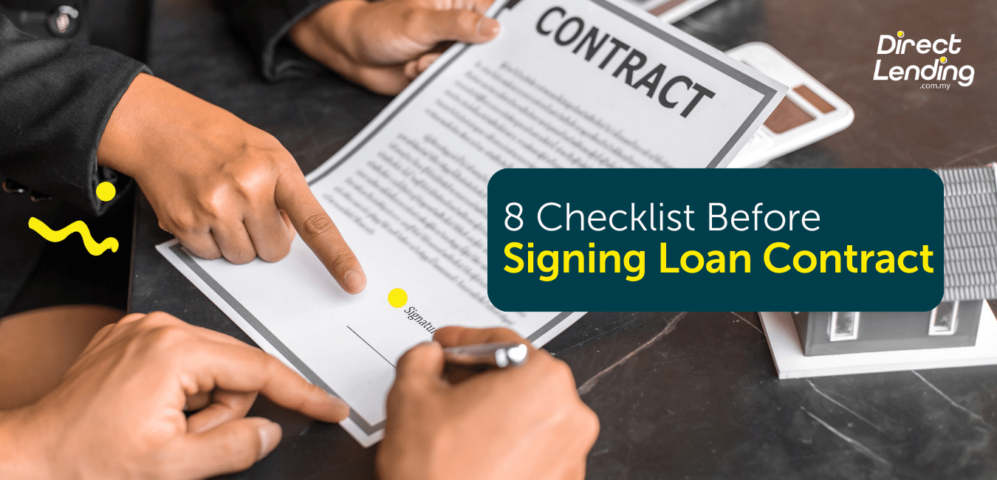By Mandy
Marketing
8 Things to Check Before Signing a Personal Loan Agreement in Malaysia

Applying for a personal loan is easy and convenient these days. Why? This is because you do not need to provide any collateral or offer security to obtain cash. What’s required from your end is to prove your creditworthiness by having a good credit CCRIS or CTOS record and a stable source of income.
So now you have your personal loan approved. What’s next? The signing of the agreement, of course. But before we dive into what you should pay extra attention to, let’s first understand what does an agreement means.
Table of contents
- What is an Agreement?
- 1. Interest Rate
- 2. Method of Repayment
- 3. Length of Loan Tenure
- 4. Late Payment Charges
- 5. Rebate
- 6. Early Settlement & Lock-in Period
- 7. Handling Fees, Processing Fees & Stamp Duty
- 8. Insurance
- Can You Negotiate Your Loan Terms?
- Compare & Get The Best Deals
- Video: Checklist Before Signing Personal Loan Agreement in Malaysia
What is an Agreement?

An agreement is the acceptance of an offer which two people mutually agree to. Some other terms that are used interchangeably are agreement and mutual covenant. In fact, we are exposed to signing agreement all the time without us realising it ourselves. For instance, even ticking the “I Agree” box on a website is an agreement itself. For more information on agreement, you can refer to the Contracts Act 1950.
If this is your first time signing a loan contract, sometimes it can feel quite overwhelming looking at some of the technical terms used. To simplify things, let us breakdown and highlight the key areas that you should look out for in your personal loan contract. It would be wise to consider a few guidelines before putting down your signature.
1. Interest Rate
First, check the type of rate offered to you. Most of the personal loans in Malaysia are offering fixed rates whereby the rates are fixed and do not change. Then, check your interest rate. This is the part that determines how much your total monthly instalment would cost.
For instance, you apply for a Koperasi personal loan from Co-opbank Pertama with a loan amount of RM10,000 with 2.95% p.a. and 10 years tenure. Your monthly installments would total up to about RM107.
Then, what you need to do is to consider if the proposed rate fits your financial situation. A higher interest rate would mean that you have to pay more for your monthly instalments.
2. Method of Repayment

Check with your loan provider to see if there are any specific methods of loan repayment. Usually, banks are pretty flexible when it comes to accepting payments. From cash deposits, cheque payments, bank transfers, and so on. However, personal loans from Koperasi loan providers would need the borrower to set up an automatic salary deduction by ANGKASA.
To know more info about Koperasi loan, check out this article on the 5 things that you need to know before applying for a Koperasi loan.
3. Length of Loan Tenure
Loan tenure refers to the period or duration of time you are given to repay a loan. Usually, in the case of personal loans in Malaysia, the minimum length of the loan tenure is 1 year (12 months) and the maximum is 10 years (120 months).
Do note that the maximum age to apply for a personal loan is below 60 years old. This means that if you apply for a personal loan at the age of 54, the length of loan tenure that you are entitled to is 6 years. However, some financial providers have set the age limit to 50 or 55. So, do check with your financial provider on this.
4. Late Payment Charges

As for late payment charges, this refers to when a borrower misses out his monthly payment after the due date. Again, depending on the bank, a fee would be imposed on the personal loan which is usually charged as a percentage of the outstanding loan amount.
However, for Islamic personal loans, there are no compounding late payment interest charges as it is prohibited by Shariah principles. The borrower would be charged based on the current outstanding balance. This means that Islamic loans would incur a lower late payment charge as compared to conventional personal loans.
Generally, to avoid the late payment penalty charge, it is advisable to pay up your monthly installments promptly. This not only would contribute to a healthier credit record but also avoid paying extra charges.
5. Rebate
Some financial institutions offer a ‘rebate’ to the borrower if he manages to settle his personal loan before the agreement ends. In general, most of the conventional banks in Malaysia calculate the rebate amount based on the ‘Rule of 78’. While the Islamic loan calculates based on the ‘Ibra’ formula. To have a better understanding of how the rebate for personal loan works, let us illustrate using this calculation example shown below.
Assuming the scenario would be personal financing of RM20,000 with a tenure of 60 months (5 years). The interest rate or profit rate would be 6%. The borrower chooses to perform early settlement after 20 months.
| Conventional Personal Loan | Islamic Personal Loan |
| [(n-3) x (n-2) / N(N+1)] x l | [N(N+1) / N (N + 1)] x PM |
| n = Number of remaining monthly instalments N = Loan tenure l = Total interest payable n = 60 – 20 = 40 N = 60 l = RM20,000 x 6% x 5 = 6,000 |
n = Number of remaining months to maturity N = Total tenure of Financing PM = Total profit margin n = 60 – 20 = 40 N = 60 PM = RM20,000 x 6% x 5 = RM6,000 |
| [(40-3) (40-2) / 60(60+1)] / x 6000 | [40(40+1) / 60(60+1)] x 6000 |
| Total Rebate: RM2,304.92 | Total Rebate: RM2,688.52 |
Do note that this is a general guideline example on how to calculate the rebate amount. The number stated above are solely used for illustration purposes. Please do check with your financial provider about the rebate amount for a valid clarification.
6. Early Settlement & Lock-in Period
An early repayment or early settlement means that a borrower decides to pay the loan amount in full before the loan tenure is over. The charges for early settlement vary from each financial institution. For example, some banks may charge borrowers based on a certain percentage of their outstanding balance or possibly a flat-rate fee. Plus, some banks do not charge any early settlement fees at all. So, do check with your financial provider on this too.
In certain cases, some personal loan agreement may include a lock-in period. This means that the borrower is not allowed to pay off a loan earlier than scheduled. For example, if the stated lock-in period is 2 years, then the borrower is not allowed to fully settle his personal loan within that period. Otherwise, he might face a penalty or early settlement fee.
7. Handling Fees, Processing Fees & Stamp Duty

It is necessary for you to understand the charges involved and loan agreement fee before proceeding with any loan. Check with the financier if there are any charges or administrative fees involved. Some financial institutions do not charge you with the handling and processing fees. For stamp duty, the charges are about 0.5% of the loan or RM5 per RM1,000. For instance, if your loan is RM10,000, your stamp duty fee is RM50.
Usually, if there are any charges, the amount would be deducted from the loan itself. Be cautious when a loan provider asks for an upfront processing fee, they are probably a scammer. Always remember, no legitimate lender will ever ask you to pay anything before you receive the loan. Check out these 6 warning signs if the personal loan you are getting is a scam.
Some Koperasi loans would also include a membership fee ranging from RM25 – RM30 monthly. Again, this would be deducted from your salary together with your monthly repayment.
8. Insurance
Other than the loan agreement fee mentioned, usually, a borrower signs up for insurance to minimise their loan defaults in case there is a total permanent disability (TPD) or death involved. Insurance is a way to secure protection for both the borrower and loan provider.
The insurance premium is calculated by the sum of loan payout. Usually, the borrower would undertake an insurance policy from the loan provider’s insurer. However, some loan providers offer the flexibility to borrowers to choose their own insurers. While some loan providers do not make it compulsory for borrowers to apply for insurance considering that some personal loan is a short term which is less than 3 years.
Can You Negotiate Your Loan Terms?

What if you don’t agree with the terms of your personal loan? Well, most loan agreements are non-negotiable meaning they come with standard terms. Unless you would want to negotiate to lower down on your interest rate. Try negotiating with your loan officer to see what other options are available to help reduce your interest rate. Or whether it is to extend your loan tenure or increase your borrowed amount.
Compare & Get The Best Deals

At the end of the day, source for a lender that can provide you with the product and loan terms that suits your financial needs. As a gentle reminder, although a personal loan with a low interest rate sounds convincing, do lookout for its hidden charges too. Keep in mind the focus areas that we have highlighted and be a smart borrower.
Video: Checklist Before Signing Personal Loan Agreement in Malaysia
Watch this video to understand what you should know before signing a loan agreement
If you are a government servant and is looking for the best bank or Koperasi loan in town, you can get the best deals on – Direct Lending platform. Our smart system can help you to search and match the most suitable personal loan to solve your financial needs. And the best part is we will help you for free. Absolutely zero charges involved!
Do follow our Facebook page and blog for more financial tips!
(This article was originally published on the 30th September 2020 and updated on the 24th April 2024).
About the writer
Mandy
An ex-banker, digital marketer, and masters graduate from University of Coventry. Mandy enjoys filling in the gaps of financial literacy by transforming ‘dry’ financial topics into ‘digestible’ articles. She did a lot of ballet growing up and is always on the hunt for the best deals online.



